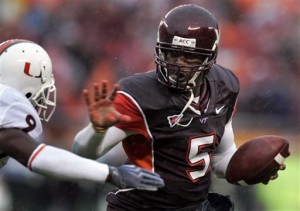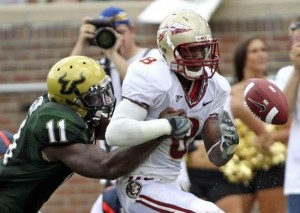College Football Week Four Review: Revivals Aren’t What They Used To Be

Virginia Tech ended Miami's brief foray into the top 10 with a dominating 31-7 victory.
One of the early themes of the 2009 college football season has been the revivals demonstrated by a number of programs that had struggled in recent years, but gave indications early in this season that they were ready for a return to prominence.
Some, like Florida State, Miami and Michigan were looking to return to their one-time place among the national elite while others, including California, Mississippi and North Carolina, seemed poised to enter the national championship conversation for the first time in generations.
Well, I guess revivals aren’t what they used to be. Many of those teams were soundly defeated, some by lesser competition, and all struggled on the last weekend of September.
The poster child early this season for the theme of returning to prominence has been the University of Miami. Following impressive victories over Florida State and Georgia Tech, many well-respected national college football “experts” were gushing over how the “U” was back in the national picture. In fact, they went from being unranked at the start of the season to ranked 9th nationally after just two games.
As I wrote earlier this month, we would learn whether the Hurricanes were contenders or pretenders during their stretch of games against Georgia Tech, Virginia Tech and Oklahoma.
Well, they passed the test against Georgia Tech, but failed miserably against the Hokies in a 31-7 thrashing. Next week they host an Oklahoma team that is at the very least as good as Virginia Tech and likely significantly stronger.
Don’t get me wrong, I think Randy Shannon is a good coach and will be successful at Miami, but they are the epitome of a program still living on past reputation. Had someone like the University of Virginia, Clemson or Boston College opened the season with wins over Florida State and Georgia Tech after being unranked to start the year they probably would have cracked the top 25, but definitely not the top 10.
In many ways, Florida State has been living off their reputation for years and this season seems to be no different. After losing a close game to Miami, the Seminoles had to score two touchdowns in the final minute to defeat Division I-AA Jacksonville State at home.
Yet, after an impressive win on the road at Brigham Young, the Seminoles jumped from unranked to 18th in the polls. Granted, FSU looked very good in beating a BYU team that many thought might be a BCS contender, but again a team with a lesser national reputation would not have made such a move so quickly.
The Seminoles again proved that word of their revival was a bit premature as they were embarrassed Saturday at home by a South Florida team that was playing their first game without their senior team leader and starting quarterback.

Florida State could never gain a handle against South Florida.
With Matt Grothe out for the year with a knee injury, many expected the Seminoles to easily win at home. The top columnist for the Orlando Sentinel even went as far as to predict that FSU would win by 30 points.
Not only did the Seminoles score only seven points in a 17-7 loss, but the quarterback who led the charge, red-shirt freshman B.J. Daniels, was a local product from the Tallahassee area that had not been seriously recruited by his hometown team.
In the case of both FSU and Miami, it seems like the media is so anxious to get them back on “the map” that anytime they make a little progress, the success is overblown.
I can pretty much guarantee that regardless of their performances against Jacksonville State and USF, if Florida State wins their next three games against Boston College, Georgia Tech and North Carolina you will see them back in the top 20. Same can be said for Miami, who will probably still be in the top 20 when they face Oklahoma next week.
Surprisingly, while FSU and Miami made quick entries into the polls, it has been a little harder for Michigan to gain the support of the national media. Despite winning their first three games, including a dramatic win over Notre Dame, the Wolverines were ranked only 23rd.
In reality, that ranking probably was much closer to accurate than the higher rankings bestowed on FSU and Miami.
Hosting Indiana, a school not generally recognized for their football prominence, the Wolverines struggled, but held on for a 36-33 victory.
With road games at Michigan State and Iowa in the next two weeks, we should get an idea soon as to whether Michigan is deserving of any ranking.
While fans of FSU, Miami and Michigan are all accustomed to high rankings, being considered in the conversation for the BCS bowls is new territory for California, Mississippi and North Carolina.
Both California and Mississippi began the season as popular dark-horse candidates to win their conference and contend for a national title and North Carolina was starting to emerge as one after some early season wins.
However, all three came tumbling back to earth before the season even hit October.
California’s 42-3 pummeling by Oregon was the most surprising as it was just three weeks ago that the Ducks looked like their season had been stymied before it had a chance to start. Oregon lost to Boise State in their season opener and lost their best offensive player for the season due to a suspension following an incident at the end of the game.
Instead, the Ducks have revived their season while it is clear that the Golden Bears were not worthy of the number six ranking.
Similarly, Mississippi was anointed as an early season top five team despite not really doing anything on the field that was worthy of such a lofty appointment.
Steve Spurrier and the South Carolina Gamecocks exposed the Rebels in a 16-10 victory that will certainly end any hope Ole Miss had of earning a spot in the national championship game.
Under the guidance of former Miami head coach Butch Davis, North Carolina also has become a popular pick by some as a team that could win the ACC and gain a spot in a BCS bowl.
The ACC has been under-whelming against non-conference opponents so far this season, which seemed to work in favor of Davis and the Tar Heels. However, a 24-7 loss to Georgia Tech will probably knock them out of the top 25 and make it more difficult for them to claim the conference title.
There have been many debates and arguments as to whether polls and rankings during the first month of the season really provide insight into which teams are the best in college football.
Given that at least one top five team has now lost in each of the first four weeks of the season and four top 10 teams fell this week, it seems apparent that early season rankings don’t really hold much water. It stands as a good reminder that in college football it isn’t about where you start, it’s about where you finish.
So, while these early season revivals have been exciting to watch, it is the late season revivals that will really have meaning as we reach the heart of the college football season.
You made some respectable factors there. I regarded on the internet for the problem and located most people will go together with with your website.